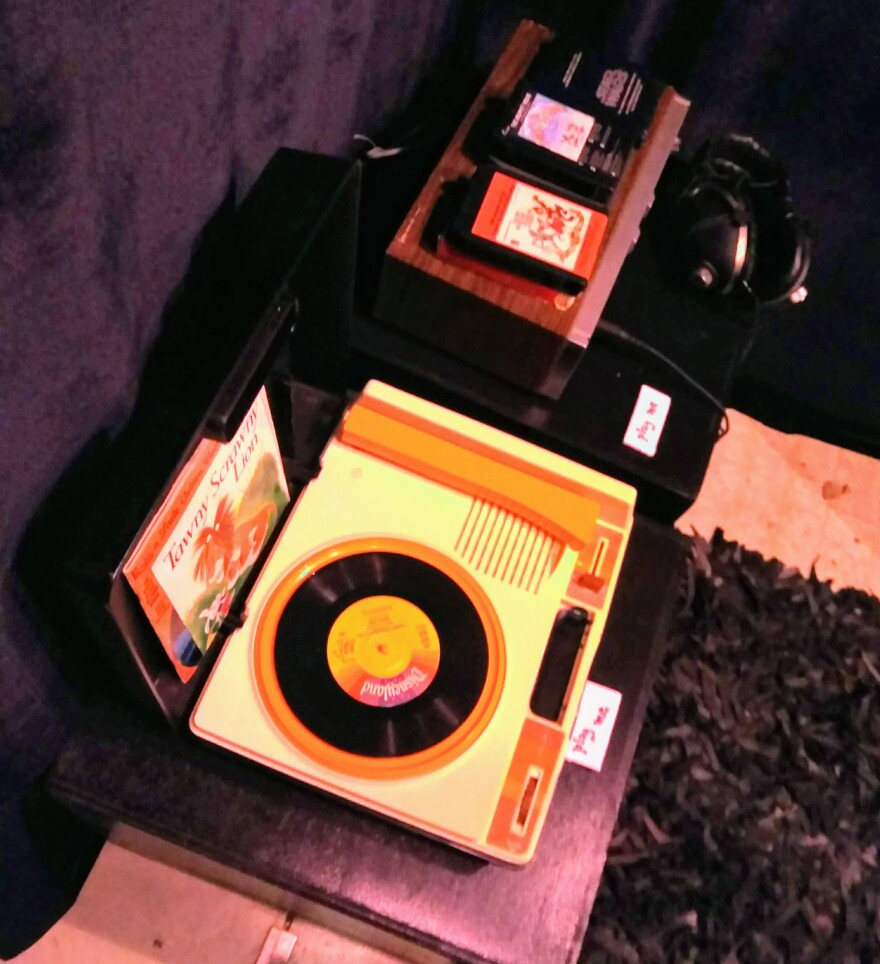A recent immersive exhibit in Turners Falls, Massachusetts, included the option to eat potato chips and watch TV — and it was all part of the art.
Artist Joe Dulude II recreated his childhood living room for all to see — and touch, and feel — in the back room of a store.
"These are all the things I had from the '70s — like my Fisher-Price record player," Dulude said. "I used to listen to this Little Golden Book, 'Tawny Scrawny Lion.'"
The record player was among a dozen or so items viewers were invited to play, and listen to, and to pick up in Dulude’s exhibit, "Memory in a Void" — dolls, eight-track tapes and a player, a model space ship he built with his father, and a GAF View-Master.
A cassette player and some old tapes were also on a bookshelf. When they were kids, Dulude and his brother used to interview each other and impersonate others.
"We used to do some really silly things," Dulude said, as he played a few seconds of their squeaky voices attempting to sound like serious adults.

Dulude was born in 1971 and grew up in Pawtucket, Rhode Island. He now lives in western Massachusetts.
When he's not acting in immersive shows at the Shea Theater in Turners Falls, or setting up spaces like this, Dulude is a makeup designer for Broadway shows. His latest, "Beetlejuice," opened the same week as "Memory in a Void" in the weekend art show Radical Interconnectedness.
One man's childhood — but maybe yours, too
Off to the side, visitors could take a seat in a lounge chair and watch TV shows from the era. "The Love Boat," "Wonder Woman," "The Lawrence Welk Show" and cartoons were playing in a loop.
Within arm’s reach was a bowl of potato chips — another piece of Dulude’s childhood, set up on a folding TV table. The bowl was lined with paper just like Dulude’s parents would do when friends came over to play cards.

"Everything [in the exhibit] can be touched. Everything can be moved around played with — well, obviously, except for the things that are glued onto the frames," he said. "But everything else [can be touched], just to be able to have an experience."
It’s an experience that reminded viewers of the past, whether or not they also listened over and over to that same Fleetwood Mac song, one of several hits from the '70s and early '80s that played in the background.
'Memory is vague'
Dulude already owned about a third of the items set up in the two small rooms. Others he found on eBay.
With the music and TV going within hearing range, an old projector displayed dozens of slides from Dulude’s childhood. A rotary telephone was near a Waring blender, like one Dulude's mother had with a 1970s-ish mustard-brown base. But Dulude painted the glass container black.

"I painted a lot of the items black, and left some parts of them in color, because memory is vague, and everything fades out on the sides," he said. "But then you have some things you see very clearly."
On his battery-operated board game Operation, Dulude painted the entire body black. But the nose of the patient still flashed red when a player botched the "surgery." Dulude was delighted to show everyone the game still worked.
Visitors to "Memory in a Void" may not have been thinking about Dulude’s family, or even have known that his parents were supportive, despite not understanding "their son, the artist." He didn’t want to force an experience on anyone.
The viewer's response will be unique, Dulude said, and may be connected to their own childhood.
"I think that's what good art does," he said. "Like it's telling you a story, but it's not telling you how you should feel from that story. You get your own feeling, and you get your own interpretation of it."
A lot of emotion went in to putting "Memory in a Void" together, Dulude said. Another — maybe unintended — immersive experience in the room belonged to Dulude, watching strangers sift through a decade of his childhood.
















